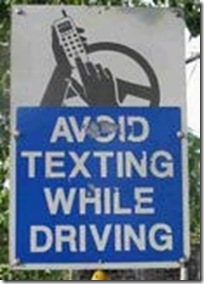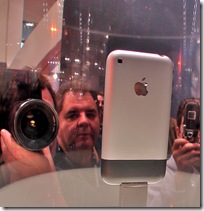 Six months ago I turned off automatic email downloading on my phone; it was one of the best decisions I’ve made.
Six months ago I turned off automatic email downloading on my phone; it was one of the best decisions I’ve made.
Having access to email on the go is helpful (as is web access), but downloading email automatically does more harm than good.
Instead, consider checking email only when you have the time to act on it, or when you’re looking for a very specific, timely message. I list instructions below on how to disable auto-check…but first, here are ten reasons:
- Battery life. Constantly checking email kills your talk time. Since turning off "automatic synchronizing," the battery life on my Motorola Q (Windows Mobile) has more than doubled from "I hate this worthless phone that doesn’t last a day" to "oh, I forgot the charger, no big deal"
- Setting expectations. Anything you can do to train your contacts that you are not their slave is to your advantage. Writing back in a few hours (preferably at your desk) is perfectly reasonable (my thoughts on being responsive vs being available)–don’t let people think you’re always available for them
- Quality of response. You may have an itch to respond to emails right away, to get that tiny responsibility out of the way. But the quality of a 90 second response on a BlackBerry is rarely as high as a 15 second response on a computer. Typos and grammar are just a few of the problems a small screen and tiny keyboard lead to–people forget to respond to all the points, and
 often omit the necessary detail they would’ve typed on a full keyboard. These shortcuts are often confusing and poorly received by the recipient. If you don’t have your email delivered to your phone all the time, you won’t be as tempted to respond. (If you have to get back to someone on an important topic and don’t have a computer handy, consider calling instead)
often omit the necessary detail they would’ve typed on a full keyboard. These shortcuts are often confusing and poorly received by the recipient. If you don’t have your email delivered to your phone all the time, you won’t be as tempted to respond. (If you have to get back to someone on an important topic and don’t have a computer handy, consider calling instead) - Does it really save you time? If it’s easier to both read and write messages back at your desk (and to think through them), consider the time you’re taking away from whatever you’re doing. Finding out sooner, when you aren’t focused and can’t respond intelligently, often isn’t saving you any time
- Sanity. For the same reason you shouldn’t read emails as they arrive on your desktop, reading emails as they arrive on your handheld can completely mess up whatever you’re doing. You never know when a frustrating or exciting email will arrive; save yourself the trouble and focus on what you’re doing…then check your email when you’re finished with that task
- Out of site, out of mind. The less connected you are, the more at peace you’ll be in your current setting. Wouldn’t it be great to be present at the restaurant, the movie, etc? Get in the habit of not checking your email on the go unless there’s a reason to, and you’ll start enjoying your surroundings much more (and leaving work thoughts behind)
- Driving safety. Do I need to say more? How about this story or the fact that many states will ticket you?
 It’s just not cool. Your phone may be a pop culture icon, but repetitively looking at it makes you look like a dork. No, people won’t think you’re "important"
It’s just not cool. Your phone may be a pop culture icon, but repetitively looking at it makes you look like a dork. No, people won’t think you’re "important" - Politeness. People feel unimportant when you keep looking away from them and at your phone. Are your real world friends less important than a message from your neighbor on Dogster?
- Consider the medium. Email may be sent through the internet rapidly, but it’s not instant messaging or SMS (text messaging). It’s not an instantaneous communication and it’s perfectly acceptable for you not to treat it that way.
Here’s how to turn off "push email" or automatic email downloading…
- On a Palm Treo
- On a BlackBerry, you can turn off data in the Options, Network area
- On an ActiveSync device, go to your Synchronization screen, click Menu, select Schedule and change both Peak times and Off-peak times to "Manually"
- On an iPhone, in the Mail Settings screen, set Auto-Check to "Manual"
Turning off automatic downloading of email has made my life noticeably more pleasant. At my computer, I can get caught up with looking at all the new messages and RSS feeds that appear…but at least when I’m away from my desk I’m less distracted.
Think auto-check or push email are difficult to escape from? Have trouble managing others expectations? Please post your thoughts in the comments.
Stumble or Digg are really helpful– :-)!
If you came from Lifehacker, you might like these posts:
- Twelve mobile websites that are really practical
- Five Tips for how to process email without being a jerk
- Everything you need to know about canceling appointments or responding to cancellations
And I’d certainly love if you subscribed to the blog (RSS or email), which is focused on productivity with technology and social media! Thank you so much for reading.


You should really subscribe to Technotheory via ![]() email or rss.
email or rss.



 by Jared Goralnick
by Jared Goralnick










Hey great post. I couldn’t agree more. I stopped using normal email on blackberry ages ago and switched to the gmail client. It also forces you to do a lot of the items on your list as you only check it when you need to, and also you don’t get that annoying red light that makes you feel like you have to check the message.
Chad, so glad this works for you, and thanks for the comment.
You also bring up a fantastic point! It’s NOT just about turning off notifications–it’s about NOT CHECKING. What I mean by that is that over the course of the day one is going to take their phone out for various reasons. If they see a blinking red light or an unread messages count they’re going to want to open up the emails. That only happens with auto-check turned on. Thus this isn’t just about the notifications–it’s about completely turning off the auto-check behavior.
It can also be very expensive! I was on a free 30 mb a month package with my provider in the UK. I was using the IMAP function on the HTC TitanII. Downloading only text and no attachments, I was under the impression that 30 megs would be more than OK. When I got my monthly bill of £450 ($900) I changed that policy pretty quickly!
It was something to do with unread imap messages being downloaded everytime it checked for new messages, meaning that over night I would clock up bandwidth exponentially.
I now use google mail on my phone for my google apps account – which I check all the time – and seldom use more than 8megs a month.
Oh, and Orange let me off the £450, so I don’t need to sell all my household possessions just yet…
If I had an unlimited package, email on my phone would simply become the new text message, albeit a lot longer messages and potentially far more important.
FYI: you mention that you are checking email on a Motorola Q; unless you are using MS Exchange, then you are using a battery inefficient method of POP or IMAP polling. Meaning that you waste battery life not because you are checking email, but because of HOW you are checking email. The data connection isn’t constant, as it is on a Blackberry, it has to be started and stopped. This eats into your battery life, and especially on a device with anemic power management such as the Moto Q (pre Windows Mobile 6 update).
That would make your point #1 kinda moot on other devices (most of which have better battery life) and definitely when it comes to the Blackberry system, or any devices that use MS Exchange Servers with Active Sync.
The other points you note seem more like reasons to set personal boundaries of how to use mobile technoolgy effectively and efficiently. If you will, you point to prioritizing communication in light of the context that you are in rather than letting it prioritize you.
“…don’t let people think you’re always available for them”
Sure, you may not want this with “needy” friends, by my clients have to know that I’m ALWAYS AVAILABLE FOR THEM or they will go elsewhere.
I don’t think this article is intended for business people.
Thanks for the thoughtful feedback!
Alex, very good point on the surprising effects of checking email all the time on one’s bandwidth–yet another good reason. It’s also good to know that some methods, like installing Google’s client (it sounds like that’s what you did) are more efficient, too.
Antoine, I do use the Moto Q for ActiveSync, and that was the main reason for which I purchased the phone. However, I do also use IMAP (and before that, POP)…and that plays in a great deal with the battery life. It’s hard for me personally to pinpoint how much battery was used for IMAP vs ActiveSync, but I think the big thing is that when you have email messages continually arriveing, you’re much more likely to use your phone to read/respond…which inadvertently eats at the battery more than just the act of checking.
You are absolutely right, as well, that the focus of my article was more about personal boundaries and lifestyle design than purely technical reasons.
DDX, to that end–I must disagree that this isn’t intended for businesspeople. There are people in support functions who must be on call all the time, and for those it’s part of the job to be accessible. But most people’s jobs are not mission critical and a few hours time will not make or break their success. There’s also the phone for emergencies…
A lot of what I write about on this blog is that the world is NOT going to end if you take more time for yourself; quite the opposite, people will respect you for respecting your time. We could go back and forth on this, but I’d highly recommend Tim Ferriss’ book, The Four Hour Workweek, which goes into this discussion in length. Addiitonally, I’ve written much on the topic, such as The Difference between being responsive and too available. I hope that helps–it’s kind of a personal mission to help people find more time for themselves :-)
Thanks again for all the feedback–I’m learning a bit!
A great reminder about who is in charge of your time – you or the person sending you the message.Thanks!
Some very good points. I prefer to turn off notification of new email on my Blackberry rather than turning off data reception entirely.
I turn off notifications on my cell phone while I am at work, but I feel safer away from my computer with them on. I check my phone once every hour or so when away from my desk. Once my CEO had an issue with a client, and decided to email me instead of calling. My prompt callback really impressed him. I never reply to email from my cell phone. If there is something that I really need to reply to I will get my computer out and give a proper reply.
John, good points on NOTIFICATION vs SERVICE–while I think it’s best to turn it all off, I can certainly see the benefits.
Bob, I agree with you that one can really improve their customer service by checking “all the time”–if you don’t get a lot of notifications then it’s mostly a nonissue–I’m more writing from the perspective of trying to manage the expectations of those emailing you.
Thank you both!
I TOTALLY disagree. I like knowing when I have email arriving the minute it hits my inbox. I don’t always check at it that very moment it but I like having the option to do so when it is convenient to me and not disruptive to others. I like this option because I am required to login at work everytime I use the internet or if I am traveling, and have no internet on a laptop, this is a great way to keep up with my communications. I scan my emails when I have time, and it is appropriate, and if there is something that deems my immediate attention, then I login to the web and respond at work or wait until I get to the hotel. The only exception to this if the sender just needs a yes/no type/quck high level answer. This way, I am not constantly logging on the net at work and I can respond to those emails that need my attention. I love it and can’t imagine NOT having it ever again. It’s about you managing your technology and your technology NOT managing you.
I agree with you that one can really improve their customer service by checking “all the time”–if you don’t get a lot of notifications then it’s mostly a nonissue–I’m more writing from the perspective of trying to manage the expectations of those emailing you.